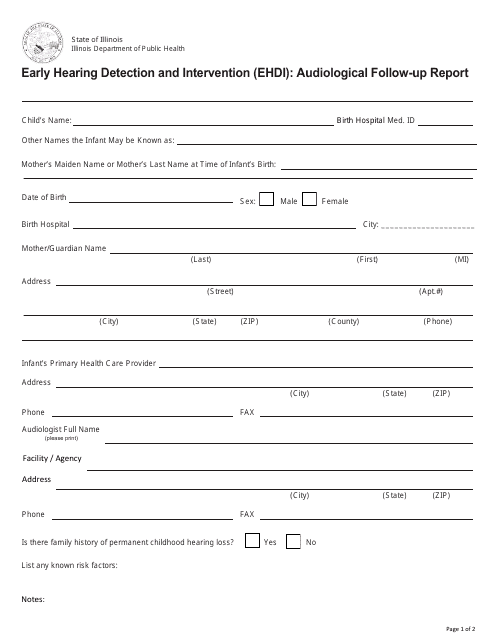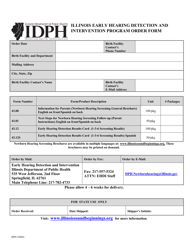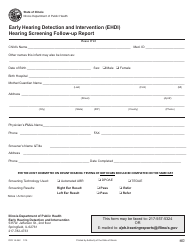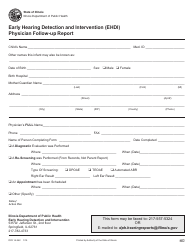Form IOCI14-342 Early Hearing Detection and Intervention (Ehdi) Audiological Follow-Up Report - Illinois
What Is Form IOCI14-342?
This is a legal form that was released by the Illinois Department of Public Health - a government authority operating within Illinois. As of today, no separate filing guidelines for the form are provided by the issuing department.
FAQ
Q: What is the purpose of the Early Hearing Detection and Intervention (EHDI) program?
A: The purpose of the EHDI program is to identify hearing loss in newborns and infants as early as possible and to provide appropriate intervention services.
Q: What is an audiologist?
A: An audiologist is a healthcare professional who specializes in evaluating, diagnosing, and treating hearing loss and balance disorders.
Q: What is an audiological follow-up report?
A: An audiological follow-up report is a document that summarizes the results of hearing screening and diagnostic tests conducted on a newborn or infant.
Q: Why is an audiological follow-up report important?
A: An audiological follow-up report is important because it provides information about a child's hearing status and helps determine if further intervention or treatment is needed.
Q: Who completes the audiological follow-up report?
A: An audiologist completes the audiological follow-up report based on the results of the hearing tests they conducted.
Q: What information is included in an audiological follow-up report?
A: An audiological follow-up report typically includes the child's demographic information, details of the hearing screening and diagnostic tests performed, test results, and recommendations for further intervention.
Q: What happens if a child's audiological follow-up report indicates hearing loss?
A: If a child's audiological follow-up report indicates hearing loss, further intervention services such as hearing aids or cochlear implants may be recommended.
Q: Who receives the audiological follow-up report?
A: The audiological follow-up report is typically shared with the child's parents or guardians, healthcare providers, and the EHDI program coordinators.
Q: What other services are provided by the EHDI program?
A: In addition to audiological follow-up, the EHDI program also offers services such as family support, early intervention, and educational resources for children with hearing loss.
Q: Is the EHDI program available nationwide?
A: Yes, the EHDI program is available nationwide and is implemented in all 50 states, as well as the District of Columbia and U.S. territories.
Form Details:
- Released on January 1, 2015;
- The latest edition provided by the Illinois Department of Public Health;
- Easy to use and ready to print;
- Quick to customize;
- Compatible with most PDF-viewing applications;
- Fill out the form in our online filing application.
Download a fillable version of Form IOCI14-342 by clicking the link below or browse more documents and templates provided by the Illinois Department of Public Health.







